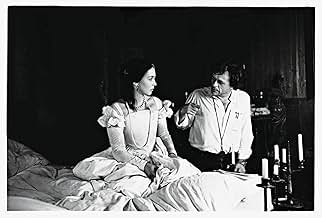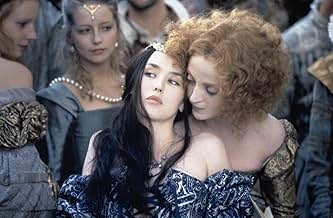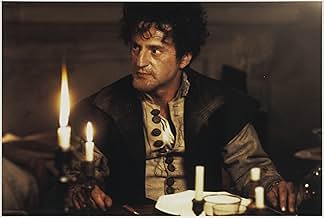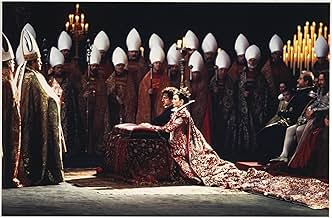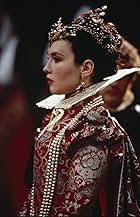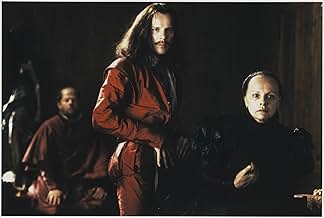La giovane regina Margot si ritrova intrappolata in un matrimonio combinato durante una guerra di religione tra cattolici e protestanti. Spera di scappare con il suo amato, ma si ritrova imp... Leggi tuttoLa giovane regina Margot si ritrova intrappolata in un matrimonio combinato durante una guerra di religione tra cattolici e protestanti. Spera di scappare con il suo amato, ma si ritrova imprigionata dalla sua famiglia potente e spietata.La giovane regina Margot si ritrova intrappolata in un matrimonio combinato durante una guerra di religione tra cattolici e protestanti. Spera di scappare con il suo amato, ma si ritrova imprigionata dalla sua famiglia potente e spietata.
- Regia
- Sceneggiatura
- Star
- Candidato a 1 Oscar
- 9 vittorie e 16 candidature totali
- Guise
- (as Miguel Bosè)
- Condé
- (as Jean-Philippe Ecoffey)
Recensioni in evidenza
In all this horror is the rather cute tale of the relationship between two disparate personalities thrown together in marriage, Catherine's daughter Margo and Henry of Navarre (later Henry IV of France, and one of its better kings). Margo is repulsed at first sight by Henry `the peasant' while Henry rightly regards her as about as loving as a trapped tiger. Yet they reach an accommodation and finish up friends. Both have other lovers (and both respect that) but neither can prevent the lovers from coming to sticky ends.
It's always a bit hard to assess the acting when you are relying on sub-titles (if only the French didn't speak so fast) but Isabella Adjani at the age of 40 pulled off a remarkable job and had me convinced she really was a spoilt, willful little nymphomaniac in her early 20's. She looked as young as she did in the `Story of Adele H' 20 years earlier. Daniel Auteuil was also excellent as the unprepossessing but very intense and quick-thinking Henry. Virna Lisi, a sex symbol in her earlier film career, made a good villainess as Catherine. Most of the other principals seem to have been chosen for their looks by rent-an-ego casting though Jean-Huges Anglade was suitably pathetic as the doomed King Charles.
The rather claustrophobic sets brought home the medieval lack of privacy, even (perhaps especially) in royal palaces the old Louvre was about as spacious as the loo. The film fades a bit in the second half, but it's still not a bad story, if at times a bit difficult to follow. I have to say I found `Elizabeth' more interesting and a lot less bloody. Anyway, `Margo' is very French, and not to be judged by Hollywood standards (whatever they are).
The movie concerns the machinations leading up to the event as well as portraying the massacre and the after effects. I'm not going to say more, as I don't want to spoil it for the viewer. However, I will say that the writing, acting and pacing of this film were excellent and kept my attention throughout. This fictionalized account of this true-life tragedy is compelling.
If one is at all interested in French history, one has already seen this movie a thousand* times, * meaning enough. However, a digital dvd transfer of the movie as it was originally intended to be seen by M. Chéreau, without subtitles, without interference,the VO [version originale] is stunning. The first and foremost difference is the lighting - il te frappe, as the French would say, "it strikes you." Not being a technician, one can't speak to the difference between the film one saw on DVD and the film one saw in American theaters, or on American DVD, or even on VHS, French and/or American. The difference is striking. From the opening scenes, one is suddenly, almost frightfully, drawn into the 16th century, an epoch without the cushions of modern life. The light is everywhere, and it shines in a way that is pitiless and revelatory. This was never, unfortunately, appparent to theater goers here, and, I suspect, to cinema goers in France. If it had been, there would have been Oscars. One is not sure cinema projection equipment can convey what M. Chéreau did with this film. Where there is light, there is "liminality" and where there are shadows, even there there is light, but it is dim (thus not liminal), and the cadaverous flesh of the living players conveys more than anyone could ever say in dialogue - these are "dead" people, living out a drama that is already predestined for them, which is a marvelously conceived conceit of the filmmaker. M. Chéreau is playing with predestination and Fate here, and it is through the art of cinema that he is doing it. Mlle Adjani turns in a bravura performance, and it is only by grace of Jeanne Moreau's 1954 performance that we have any scale of comparison. Moreau's performance is cool, ice and politics, but Adjani's is heat, love and politics, and suited to her generation. Vincent Perez is suitably heroic (watch the rose tones come and go on his flesh as the light changes). The kudos for male performances, however, are shared by Jean-Hugues Anglade, long an underrated French actor, and Daniel Auteuil, too long appreciated for his bravura performances elsewhere and not given enough credit for what he can do with a gesture, with a line, with a look. M. Auteuil is almost always lit with cool hypocrisy, (ambers and greens) as suits his performance, but M. Anglade turns in one of the best roles of his career as the doomed Charles IX, and he never looks less than "on death's door." A naturally sensitive actor, he adds a touch of "soullessness" to his Charles IX that is unforgettable - weak, yes, king, yes, momma's boy, yes, but also, in the end, needy child. It is stunning in its ultimate simplicity as a performance for cinema. Very few performances in film measure up to Virna Lisi's Catherine de Medici(s) [the s is French spelling]. She is "incroyable" (incredible), and something was wrong when she wasn't recognized universally as '94's best supporting actress. Her queen is multi-layered, loving, hating, deeply cynical yet naively superstitious, playing son against son and daughter against political reality, in other words a perfect incarnation of the 16th century in France. Any political woman you can think of could have sat at her feet and learned lessons on "how to do it." Mme Lisi herself might have been a confidante to the real Catherine, she is that good in this role. She was crowned for this performance in Europe, but should have been crowned universally. Watch her as she vacillates between love and hate and politics, and especially watch the lighting - it subtly changes according to her role of the moment. Watch her carefully towards the end, as Fate winds things up, and watch an actress give herself up totally to the role, to the moment, in order to incarnate a character that is absolutely unforgettable.
Apparently, M. Chéreau lets his actors know what he is doing, because they respond in according " shades" of emotion. When the lighting is dim, or the focus is midrange, they "fuzz" a little, giving the viewer a sense of their uncertainty, but if he focuses, they focus, too, and there are frightening moments of soul-baring intimacy when you almost want to look away - it is like watching your intimates make love; too much, too intimate, too deep. Dominique Blanc turns in a nearly flawless performance as the over-the-top lady-in-waiting to Margot - watch her lighting, too, and how she responds. "Conspiratrice", duchesse, cynical woman in love despite herself, she is very, very good. Pascal Greggory as the future Henri III is wonderful, and the rest of the cast stand out. This was obviously a labor of love and intensity, and all gave their best to M. Chéreau.
In the end, one keeps wondering what it is about the film that was so memorable - and the french dvd transfer makes it perfectly clear. The performances, yes; the "mise en scène," yes; the director, certainly. But it is the whole, the light and the shadows, the darkness and the glow, as in those candles in the marvelous square paper lanterns in the late night of the Louvre as the people begin to weave their plots, that make it memorable. Good actors, great performances, and a sure director - flawless cinema.
It's the rather beautiful Isabelle Adjani's stunning performance as Queen Margot that can leave you as breathless as she often is in the film, without her it would have been a much poorer film. She seemed to live the part, with every emotion imaginable on display. Would French breathlessness, or those huge rustling dresses sound as good dubbed into English?! On the other hand the rest of the cast are superb in their roles too, but especially Daniel Auteuil as Henri de Navarre and Jean Hugues Anglade as Charles IX, making them both extremely believable sympathetic characters when they weren't. The bloodbath and the anarchy of the Massacre and aftermath is vividly presented we are not spared a single thing in the entire film, all manner of violence and depravity is non-gratuitously displayed. It's impossible to convey a part of what happens in this film the same as it must have been impossible for the film to convey a fraction of what happened in that era too: it really is a must-see. I've seen it a number of times now since 1994 and I find something new I hadn't spotted before every time. It's a film that can make you realise (if you didn't before) that millions of ordinary folk all around the world could and still can believe in such arrant religious nonsense to the point of committing multiple ghastly murders in the name of empty air.
Apart from all that, it's a beautifully crafted film, the best of its kind there's ever been.
Then I went home to my apartment and when I turned on the TV, I got to watch torture, mutilation, immolation, throwing naked bodies in the river, all because people were of the wrong group. This time it was in Rwanda.
Catholics and Huguenots, Hutus and Tutsis, Seine or Nile, we haven't progressed very far in a half millennium.
The movie was a bit complicated, but it seemed to catch the the politics and the scheming that was taking place in the French court at the time as well as the horror of the massacre. But it is also a movie of our times: the message that civilization is only a hair-trigger away from from the most savage acts of barbarism. And that we haven't stopped even yet. The timing and the message were an accident, and made all the more vivid for it.
I highly recommend the movie for the performances but also for the message.
Lo sapevi?
- QuizPatrice Chéreau edited the original cut of the film (roughly 160 minutes) to a shorter 138 minutes for international release. This was due to the disappointing box-office performance in France and the criticism (by, among others, Variety critic Todd McCarthy) of the film as being too violent and often incoherent. The French press were scathing of this 'American censorship' (they described the film as having been 'given a face-lift' for American audiences), but the new version was defended by various French critics being both more coherent whilst also maintaining Chereau's artistic vision. The shorter cut was later released in France too, in the hopes of increasing the film's box-office takings. 20 years later, Chereau slightly re-edited his film again and re-mastered it for a new BluRay release with a running time of 161 minutes. This was one of Chereau's last completed acts before his untimely death, so it can be regarded as the definitive version.
- BlooperLa Mole is shot in the legs and the wounds and bloodstains are visible as he goes to execution. But when Margot views his semi-naked corpse, his legs are unmarked.
- Citazioni
Charles IX: One who gives life is no longer a mother once she takes that life back.
- ConnessioniFeatured in The 52nd Annual Golden Globe Awards (1995)
I più visti
Dettagli
Botteghino
- Budget
- 42.000.000 DEM (previsto)
- Lordo Stati Uniti e Canada
- 1.304.237 USD
- Fine settimana di apertura Stati Uniti e Canada
- 4985 USD
- 11 mag 2014
- Lordo in tutto il mondo
- 1.318.578 USD
Contribuisci a questa pagina



